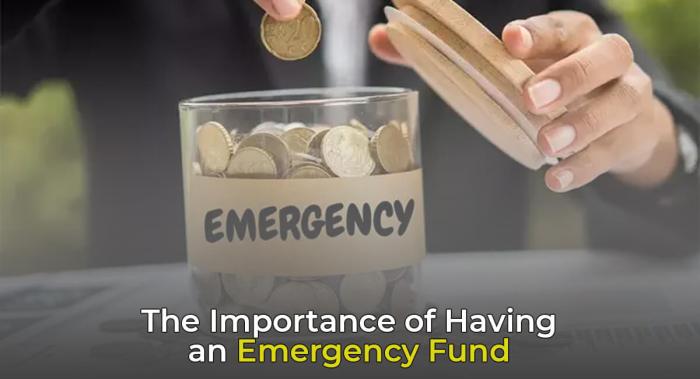Diving into the Importance of an emergency fund, this intro sets the stage for a rollercoaster ride through the world of financial preparedness. Buckle up!
Let’s explore the ins and outs of why having a financial safety net can make or break your future financial success.
Overview of an emergency fund
An emergency fund is a stash of money set aside to cover unexpected expenses or financial emergencies. Its purpose is to provide a safety net and financial security in times of need, such as job loss, medical emergencies, or car repairs. Having an emergency fund is essential for financial security as it helps prevent individuals from going into debt or having to rely on high-interest loans during unforeseen circumstances. The recommended amount to save in an emergency fund is typically three to six months’ worth of living expenses to cover essential costs like rent, utilities, food, and transportation.
Importance of an Adequate Emergency Fund
Having an adequate emergency fund ensures that you are financially prepared for unexpected situations that may arise. It provides peace of mind knowing that you have a financial cushion to fall back on in times of crisis. Without an emergency fund, individuals may be forced to take on debt or liquidate assets to cover urgent expenses, which can lead to long-term financial instability. By saving diligently and building up an emergency fund, you can protect yourself from financial setbacks and maintain stability in your overall financial health.
Importance of saving for unexpected expenses
In life, unexpected expenses can pop up at any moment, wreaking havoc on your finances if you’re not prepared. That’s why having an emergency fund is crucial to help you weather the storm when the unexpected strikes.
Impact of unexpected expenses on personal finances
Unexpected expenses can throw a wrench in your financial plans, causing stress and anxiety. From car repairs to medical emergencies, these unforeseen circumstances can quickly drain your savings and leave you struggling to make ends meet.
Examples of common unforeseen circumstances
- Medical emergencies: A sudden illness or injury can result in hefty medical bills that are not always covered by insurance.
- Car repairs: Your trusty vehicle breaking down unexpectedly can be a major financial burden.
- Home repairs: From a leaky roof to a broken appliance, home repairs can add up quickly.
How an emergency fund can prevent high-interest borrowing
An emergency fund acts as a financial safety net, allowing you to cover unexpected expenses without resorting to high-interest loans or credit cards.
By having a cushion of savings specifically designated for emergencies, you can avoid going into debt and paying exorbitant interest rates. It gives you peace of mind knowing that you have a financial buffer to rely on when life throws you a curveball.
Building an emergency fund

Building an emergency fund is crucial for financial stability and peace of mind. Here are some strategies for saving and building an emergency fund:
Automate your savings
Set up automatic transfers from your checking account to a separate savings account specifically designated for emergencies. This way, you won’t even have to think about saving, and the money will accumulate over time.
Cut unnecessary expenses
Review your monthly expenses and look for areas where you can cut back. Whether it’s eating out less often, canceling unused subscriptions, or finding more cost-effective alternatives, every dollar saved can go towards your emergency fund.
Set realistic savings goals
Establish achievable savings goals based on your income and expenses. Start small and gradually increase the amount you save each month as you become more comfortable with your budget.
Consider different savings vehicles
When setting up an emergency fund, consider the best savings vehicles that offer easy access to your funds in case of emergencies. High-yield savings accounts, money market accounts, or even a combination of both can be good options for storing your emergency fund.
